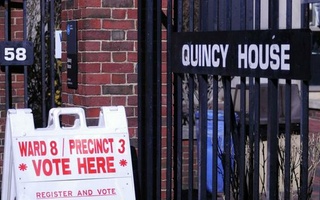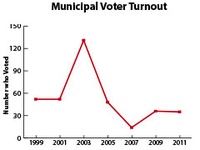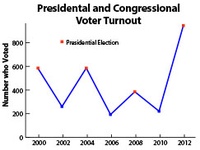
Turnout for the presidential and congressional elections spiked in 2012 during the Obama-Romney, Brown-Scott, and Ed Markey races.
In the fall of 2012 Valentina Perez ’15 found herself working in Mather dining hall to ensure that students were registered to vote and that they were aware of the different ways their votes would count in their home state versus in Massachusetts. To some, she suggested voting in their home states because of the importance their votes could have in the presidential election. To others, she recommended registering in Cambridge, in large part because of the hotly contested race going on between then-Senator Scott Brown and current-Senator Elizabeth Warren.
Her work was part of an initiative by the Institute of Politics to maximize the number of registered Harvard students and make it easier for students to vote, which included collecting sealed absentee ballots and mailing them appropriately.
“A lot of people at Harvard are...busy,” Perez told The Crimson Saturday, adding that the bureaucratic obstacles to voting were, in her view, a large factor keeping students from submitting ballots. “A lot of what we did in H-Vote was saying, ‘Okay, the IOP can stamp your envelope…. A lot of what we did was to try to reduce the hassle.”
Now, a year later, Cambridge City Council candidate Logan E. Leslie ’16 is trying to mobilize the Harvard vote on the municipal level. Though the Harvard sophomore says that he is focusing on putting together a broad base of support across the city, many of his efforts have been focused on easing the process of voter registration in Cambridge for Harvard students and motivating Cambridge’s student population, which has historically been indifferent to municipal elections, to head to the polls on Tuesday.
Leslie’s campaign could benefit from the recent increase in the number of Harvard students registered in Cambridge, which followed from last year’s efforts to register students for the 2012 presidential and senatorial races. But some question whether he can successfully maintain student interest in such a small-scale race.
“It’s just not as exciting a race as a presidential or senatorial,” said Daniel Ki ’15, director of campaigns for the Harvard College Democrats. “I think awareness is the initial issue, but now it’s a question of getting people excited enough to take the 10 minutes they need to get out and vote.”
COUNTING ON STUDENT VOTE
Logan Leslie is not the first candidate to attempt to bring the student voice to Cambridge City Council elections. In 2003, Matthew DeBergalis, an engineer with a Master’s degree in Computer Science from MIT, attempted to mobilize Cambridge’s student population around a campaign platform that promised better late-night transportation, the preservation of local nightclubs, and licenses that would allow businesses to stay open later.
DeBergalis won the endorsement of The Harvard Crimson’s editorial board. He said at the time that he had registered 800 students from Harvard and MIT and that 400 of those university students had pledged him their votes. In the time since then, an average of 33 people registered in Harvard dorms have voted in municipal elections each cycle, according to data from the City of Cambridge.
But when DeBergalis ran in 2003, 131 dorm residents turned out to vote in the City Council elections.
According to local political analyst Robert Winters, DeBergalis actually won enough votes to place him eighth in the first round of voting. But, because of a lack of broad-based support and Cambridge’s system of proportional representation, he came in 10th place in his attempt to win a seat on the nine-person Council.
“You still have to get transfer votes from other candidates...and no one else knew him,” Winters said. “So he just sat there while other candidates walked right by him.”
In an interview with The Crimson last month, Leslie said that he was not relying on the student vote for his election.
“You can’t count on any vote—I’m not counting on the student vote,” Leslie said. “I expect to have a strong student response, but I’m not basing my entire campaign on students.”
In addition to creating a student advisory committee, Leslie has proposed reforming zoning ordinances and licensing distribution in the city. Leslie has said that he hopes to preserve Harvard Square’s mom-and-pop stores while easing the process of opening new businesses in the city.
But in an email sent out this weekend to students registered to vote in Cambridge, Leslie portrayed himself primarily as a student advocate.
“I’m running to begin a conversation between students and our city’s leaders,” wrote Leslie. “I will fight to create an unprecedented student advisory committee and provide more opportunities for undergraduates to give back to the city we call home.”
Leslie called on students to head to the polls Tuesday, saying in the email that each of their votes will “truly make a difference.”
‘A SHORT-TERM OPPORTUNITY’
Rajiv Tarigopula ’14, president of the Harvard Republican Club, told The Crimson that, this fall, Leslie approached both the Harvard Republican Club and the Harvard College Democrats seeking endorsements.
Neither club ultimately chose to endorse anyone in the Council election. But Tarigopula estimated that about 10 members of the Harvard Republican Club have chosen to work for the campaign of Leslie, a registered Republican.
Ki told The Crimson that, this semester, the Harvard College Democrats’ have not been prioritizing local elections. Last year, the Democrats had worked to mobilize the student vote for the Warren senate campaign in the fall and the Markey senate campaign in the spring.
Asked about the obstacles in mobilizing the student vote in local elections, Ki discussed the differences in student interest in the Warren and Markey campaigns.
“People like voting for president and for senatorial races,” Ki said. “We had a Democratic primary for the 5th congressional district to replace Ed Markey and the turnout was a lot lower because I think people are less excited about those types of races, even though I think you can make the argument that...because fewer people are voting and because it’s on a smaller scale, your vote matters more.”
While Ki noted the difficulties that Leslie would face in motivating registered students to head to the polls on Tuesday, others discussed how Leslie was benefiting from a recent increase in the Cambridge’s student voter population—an increase that followed from the 2012 Massachusetts Senate election.
“There might be a short-term opportunity,” Winters said. “There was always a problem that people were registered in Ohio or something.”
The Massachusetts senate race between Republican Scott Brown and Democrat Elizabeth Warren had sustained national attention throughout 2012, as the election’s outcome would have an impact on the Democrats’ power in the Senate.
Perez told The Crimson that the IOP had assisted interested students in switching their voter registration from their home state to Massachusetts. That year, the Harvard College Democrats registered more than 154 students to vote in Massachusetts, with an eye towards the Warren campaign.
The national spotlight on the Warren-Brown race helps explain the uptick in the number of Harvard students who voted in Cambridge during the 2012 election cycle. According to data from the City of Cambridge, 585 people registered in Harvard dorms voted for the 2004 November elections and 385 voters from Harvard dorms did so for the 2008 November elections. But in 2012, 994 people from Harvard dorms cast their ballots in Cambridge.
‘I ACTUALLY LIVE IN NEW YORK’
Perez told The Crimson, the motivation for students to vote in the Warren-Brown race was the election’s promised effect on the national political scene.
“People would say, ‘Keep the Senate blue. Elect Warren,’” Perez said.
Perez suggested that students, since the Warren race, have shown little interest in congressional and local races, because they lack a sense of ownership in Massachusetts politics.
“A lot of students don’t really associate with the Massachusetts community,” said Perez. “They think—I live here temporarily. I actually live in New York.”
Two weeks ago, as Leslie’s team was kicking its canvassing efforts into high-gear, a Crimson op-ed on the City Council election written by Sam G. Greenberg, James B. Pollack, and Simon Thompson touched on the issue of Harvard students’ being registered in Cambridge but not identifying as Cantabrigians.
The op-ed questioned whether Harvard students were right to be fighting for a seat on the Council. The piece asked its student readers, “But are we entitled to one-ninth of the decision-making power in the city when we are only temporary residents, when many Council decisions don’t even affect us, and when we contribute so little of its revenue?”
Two days later, Eric M. Cervini ’14, campaign manager for Logan Leslie, penned a rebuttal that was also published in The Crimson.
“We live in Cambridge, and we live in a nation where voting in one’s place of residency is a right—not a privilege earned after a citizen is deemed worthy,” Cervini wrote.
Sietse Goffard ’15, Director of National Campaign for the IOP, acknowledged these concerns and pointed to some city issues that are relevant to Harvard students.
“I know there’s sort of a debate about how much legitimacy we have to be in that process because of course we go to Harvard and we’re not the sort of median voter in Cambridge,” Goffard said. “But there are lots of issues relevant to us—for example, combating crime in Cambridge and making sure that housing is affordable.”
Sara Rosenberg ’16, a native Cantabrigian and graduate of Cambridge Rindge and Latin School, said that she was glad to see Harvard students becoming involved in local politics. But she questioned whether the Harvard students who plan to vote on Tuesday have taken a close look at the election’s core issues.
“I don’t think that all Harvard students will necessarily be informed of all things that are affecting Cambridge city residents that are on the ballot,” Rosenberg said. “It takes a little more consciousness.”
Winters offered a more simplistic appraisal of student voters.
“There’s only one thing they’re interested really, which is, ‘Oh he’s one of us. Sure, we like to vote for one of us,’” Winters said. “That’s really what you’re appealing to.”
—Staff writer Sonali Y. Salgado can be reached at sonali.salgado@thecrimson.com. Follow her on Twitter @SonaliSalgado16.
Read more in News
UC Votes In Favor of Bylaws RehaulRecommended Articles
-
 HBS Grad Hoarding Web Domains
HBS Grad Hoarding Web Domains -
Magic of Numbers: Good Luck ChuckEach Thursday, The Crimson will compile a series of unique statistics about Harvard's sports scene. Welcome to the Magic of ...
-
TurboVote Eases Voter RegistrationTo combat this disconnect between activism and voting, the IOP has partnered with TurboVote, a new online voter registration service.
-
 Voter Registration Deadline for Massachusetts on Oct. 17
Voter Registration Deadline for Massachusetts on Oct. 17 -
NOTEBOOK: Freshman Continues Scoring Ways in DrawA stalemate between the Harvard women’s soccer team and BU ended the Crimson’s six game winning streak at Nickerson Field Tuesday night.
-
Wrestling Unable to Mount Comebacks Against Penn, PrincetonTwo weeks ago, Harvard wrestling dug itself out of a serious deficit to claim the win. The squad found itself in an almost identical situation twice this weekend, but this time, it was unable to claw its way back into the lead on either occasion.















